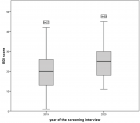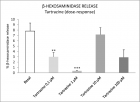Abstract
Short Communication
Burden and depressive symptoms in health care residents at COVID-19: A preliminary report
Daniela Betinassi Parro-Pires*, Sérgio Henrique de C Matias Barros, Fernanda Sabina HD Araújo, Daniel Zandoná Santos, Luiz Antônio Nogueira-Martins and Vanessa de Albuquerque Citero
Published: 08 April, 2021 | Volume 5 - Issue 1 | Pages: 005-008
This paper focuses on the mental health burden on medical and healthcare residents during the 1st wave of COVID-19 pandemic crisis in 2020 describing the activities of a mental health service for residents (NAPREME) in a public university, UNIFESP, Sao Paulo, Brazil; and a preliminary study showing an increasing of depressive symptoms and depression among residents. Data is related to the screening interviews of medical residents and healthcare multi-professional residents who sought the mental health service from March to December 2020. A comparison was conducted with the same period in 2019 (covering a period when Covid-19 was not affecting the Brazilian population). There was a 22% demand increase in 2020. Of the total amount who sought treatment: 23% were medical residents, 22% nursing residents, and the remaining distributed among other professions; and 58% were first year residents and 34% second year. Data from the BDI questionnaire showed some variance between the two years: the mean score for 2020 was 24.67 (± 7.86) which is in the depression range, higher than the mean score of 19.91 points in the previous year (± 10.15) which is only in the depressive symptoms range (p < 0.005). In the pandemic period there was an increase in residents with depression from 49% to 70%. Depression, anxiety, stress and burnout syndrome were observed, demanding psychological and psychiatric care for this population. Assessment of residents’ mental health will continue during 2021, during the 2nd wave of COVID-19 and an additional analysis will be conducted along the year.
Read Full Article HTML DOI: 10.29328/journal.ida.1001024 Cite this Article Read Full Article PDF
References
- Wong AH, Pacella-LaBarbara ML, Ray JM, Ranney ML, Chang BP. Healing the Healer: Protecting Emergency Health Care Workers' Mental Health During COVID-19. Ann Emerg Med. 2020; 76: 379-384. PubMed: https://pubmed.ncbi.nlm.nih.gov/32534830/
- Talevi D, Socci V, Carai M, Carnaghi G, Faleri S, et al. Mental health outcomes of the COVID-19 pandemic. Riv Psichiatr. 2020; 55: 137-144. PubMed: https://pubmed.ncbi.nlm.nih.gov/32489190/
- Wang S, Wen X, Dong Y, Liu B, Cui M. Psychological Influence of Coronovirus Disease 2019 (COVID-19) Pandemic on the General Public, Medical Workers, and Patients With Mental Disorders and its Countermeasures. Psychosomatics. 2020; 61: 616-624. PubMed: https://pubmed.ncbi.nlm.nih.gov/32739051/
- Rossi R, Socci V, Pacitti F, Di Lorenzo G, Di Marco A, et al. Mental Health Outcomes Among Frontline and Second-Line Health Care Workers During the Coronavirus Disease 2019 (COVID-19) Pandemic in Italy. JAMA Netw Open. 2020; 3: e2010185. PubMed: https://pubmed.ncbi.nlm.nih.gov/32463467/
- Walton M, Murray E, Christian MD. Mental health care for medical staff and affiliated healthcare workers during the COVID-19 pandemic. Eur Heart J Acute Cardiovasc Care. 2020; 9: 241-247. PubMed: https://pubmed.ncbi.nlm.nih.gov/32342698/
- Spoorthy MS, Pratapa SK, Mahant S. Mental health problems faced by healthcare workers due to the COVID-19 pandemic-A review. Asian J Psychiatr. 2020; 51: 102119. PubMed: https://pubmed.ncbi.nlm.nih.gov/32339895/
- Shanafelt T, Ripp J, Trockel M. Understanding and Addressing Sources of Anxiety Among Health Care Professionals During the COVID-19 Pandemic. JAMA. 2020; 323 :2133-2134. PubMed: https://pubmed.ncbi.nlm.nih.gov/32259193/
- Lai J, Ma S, Wang Y, Cai Z, Hu J, et al. Factors Associated With Mental Health Outcomes Among Health Care Workers Exposed to Coronavirus Disease 2019. JAMA Netw Open. 2020; 3: e203976. PubMed: https://www.ncbi.nlm.nih.gov/pmc/articles/PMC7090843/
- Gorenstein C, Andrade L. Validation of a Portuguese version of the Beck Depression Inventory and the State-Trait Anxiety Inventory in Brazilian subjects. Braz J Med Biol Res. 1996; 29: 453-457. PubMed: https://pubmed.ncbi.nlm.nih.gov/8736107/
- Parro-Pires DB, Nogueira-Martins LA, Citero VA. Interns' depressive symptoms evolution and training aspects: a prospective cohort study. Rev Assoc Med Bras (1992). 2018; 64: 806-813. PubMed: https://pubmed.ncbi.nlm.nih.gov/30673001/
Figures:

Figure 1
Similar Articles
-
Burnout and Related Factors in Caregivers of outpatients with SchizophreniaHatice Demirbas*,Erguvan Tugba Ozel Kizil. Burnout and Related Factors in Caregivers of outpatients with Schizophrenia. . 2017 doi: 10.29328/journal.hda.1001001; 1: 001-011
-
Multi-factorial Depressive Disorders Need Multi-dimensional InterventionsMustafa Melih Bilgi*. Multi-factorial Depressive Disorders Need Multi-dimensional Interventions. . 2017 doi: 10.29328/journal.hda.1001002; 1: 012-014
-
Anxiety and depression as an effect of birth order or being an only child: Results of an internet survey in Poland and GermanyJochen Hardt*,Lisa Weyer,Malgorzata Dragan,Wilfried Laubach. Anxiety and depression as an effect of birth order or being an only child: Results of an internet survey in Poland and Germany. . 2017 doi: 10.29328/journal.hda.1001003; 1: 015-022
-
Spiritual and religious Islamic perspectives of healing of posttraumatic stress disorderMevludin Hasanović*,Izet Pajević,Osman Sinanović. Spiritual and religious Islamic perspectives of healing of posttraumatic stress disorder. . 2017 doi: 10.29328/journal.hda.1001004; 1: 023-029
-
May we feed cancer?Maria Grazia Spurio*. May we feed cancer?. . 2018 doi: 10.29328/journal.ida.1001005; 2: 001-006
-
Vestibular-limbic relationships: Brain mappingPaolo Gamba*. Vestibular-limbic relationships: Brain mapping. . 2018 doi: 10.29328/journal.ida.1001006; 2: 007-013
-
Responding to Disasters: More than economic and infrastructure interventionsDavid Crompton OAM*,Ross Young,Jane Shakespeare-Finch,Beverley Raphael AM. Responding to Disasters: More than economic and infrastructure interventions. . 2018 doi: 10.29328/journal.ida.1001007; 2: 014-028
-
Mindset kinetics and some depression status: A new quantitative model under biochemical - toxicology approach?Luisetto M*,Ghulam Rasool Mashori,Behzad Nili-Ahmadabadi,Farhan Ahmad Khan,Kausar Rehman Khan. Mindset kinetics and some depression status: A new quantitative model under biochemical - toxicology approach?. . 2018 doi: 10.29328/journal.ida.1001008; 2: 029-039
-
Anti-anxiety effects in mice following acute administration of Ficus Thonningii (wild fig)Aduema W*,Akunneh-Wariso C,Ejiofo DC,Amah AK. Anti-anxiety effects in mice following acute administration of Ficus Thonningii (wild fig). . 2018 doi: 10.29328/journal.ida.1001009; 2: 040-047
-
Sleeplessness and healthSunitha V,Jeyastri Kurushev,Felicia Chitra,Manjubala Dash*. Sleeplessness and health. . 2019 doi: 10.29328/journal.ida.1001010; 3: 001-007
Recently Viewed
-
Strengthening Healthcare Delivery in the Democratic Republic of Congo through Adequate Nursing WorkforceMin Kyung Shin, Tshibambe N Tshimbombu*. Strengthening Healthcare Delivery in the Democratic Republic of Congo through Adequate Nursing Workforce. Clin J Nurs Care Pract. 2024: doi: 10.29328/journal.cjncp.1001051; 8: 007-010
-
Chemical constituents and biological activities of Artocarpus heterophyllus lam (Jackfruit): A reviewSibi G*,Pranay Raja Bhad,Meeneri Vilas Bobde. Chemical constituents and biological activities of Artocarpus heterophyllus lam (Jackfruit): A review. Int J Clin Microbiol Biochem Technol. 2021: doi: 10.29328/journal.ijcmbt.1001019; 4: 005-009
-
The clinicopathological correlates of Cystoisosporiasis in immunocompetent, immunocompromised and HIV-infected/AIDS patients, but neglected in SARS-COV-2/COVID-19 patients?Chrysanthus Chukwuma Sr*. The clinicopathological correlates of Cystoisosporiasis in immunocompetent, immunocompromised and HIV-infected/AIDS patients, but neglected in SARS-COV-2/COVID-19 patients?. Int J Clin Microbiol Biochem Technol. 2021: doi: 10.29328/journal.ijcmbt.1001018; 4: 001-004
-
Explicating the presentations of Acanthamoeba keratitis with special concern in the COVID-19 pandemic ambientChrysanthus Chukwuma Sr*. Explicating the presentations of Acanthamoeba keratitis with special concern in the COVID-19 pandemic ambient. Int J Clin Microbiol Biochem Technol. 2021: doi: 10.29328/journal.ijcmbt.1001020; 4: 010-015
-
Coronavirus COVID-19 surface properties: Electrical charges statusLuisetto M*,Tarro G,Khaled Edbey,Farhan Ahmad Khan,Yesvi AR,Nili BA,Fiazza C,Mashori GR,President, IMA Academy, Italy. Coronavirus COVID-19 surface properties: Electrical charges status. Int J Clin Microbiol Biochem Technol. 2021: doi: 10.29328/journal.ijcmbt.1001021; 4: 016-027
Most Viewed
-
Evaluation of Biostimulants Based on Recovered Protein Hydrolysates from Animal By-products as Plant Growth EnhancersH Pérez-Aguilar*, M Lacruz-Asaro, F Arán-Ais. Evaluation of Biostimulants Based on Recovered Protein Hydrolysates from Animal By-products as Plant Growth Enhancers. J Plant Sci Phytopathol. 2023 doi: 10.29328/journal.jpsp.1001104; 7: 042-047
-
Sinonasal Myxoma Extending into the Orbit in a 4-Year Old: A Case PresentationJulian A Purrinos*, Ramzi Younis. Sinonasal Myxoma Extending into the Orbit in a 4-Year Old: A Case Presentation. Arch Case Rep. 2024 doi: 10.29328/journal.acr.1001099; 8: 075-077
-
Feasibility study of magnetic sensing for detecting single-neuron action potentialsDenis Tonini,Kai Wu,Renata Saha,Jian-Ping Wang*. Feasibility study of magnetic sensing for detecting single-neuron action potentials. Ann Biomed Sci Eng. 2022 doi: 10.29328/journal.abse.1001018; 6: 019-029
-
Pediatric Dysgerminoma: Unveiling a Rare Ovarian TumorFaten Limaiem*, Khalil Saffar, Ahmed Halouani. Pediatric Dysgerminoma: Unveiling a Rare Ovarian Tumor. Arch Case Rep. 2024 doi: 10.29328/journal.acr.1001087; 8: 010-013
-
Physical activity can change the physiological and psychological circumstances during COVID-19 pandemic: A narrative reviewKhashayar Maroufi*. Physical activity can change the physiological and psychological circumstances during COVID-19 pandemic: A narrative review. J Sports Med Ther. 2021 doi: 10.29328/journal.jsmt.1001051; 6: 001-007

HSPI: We're glad you're here. Please click "create a new Query" if you are a new visitor to our website and need further information from us.
If you are already a member of our network and need to keep track of any developments regarding a question you have already submitted, click "take me to my Query."
















































































































































